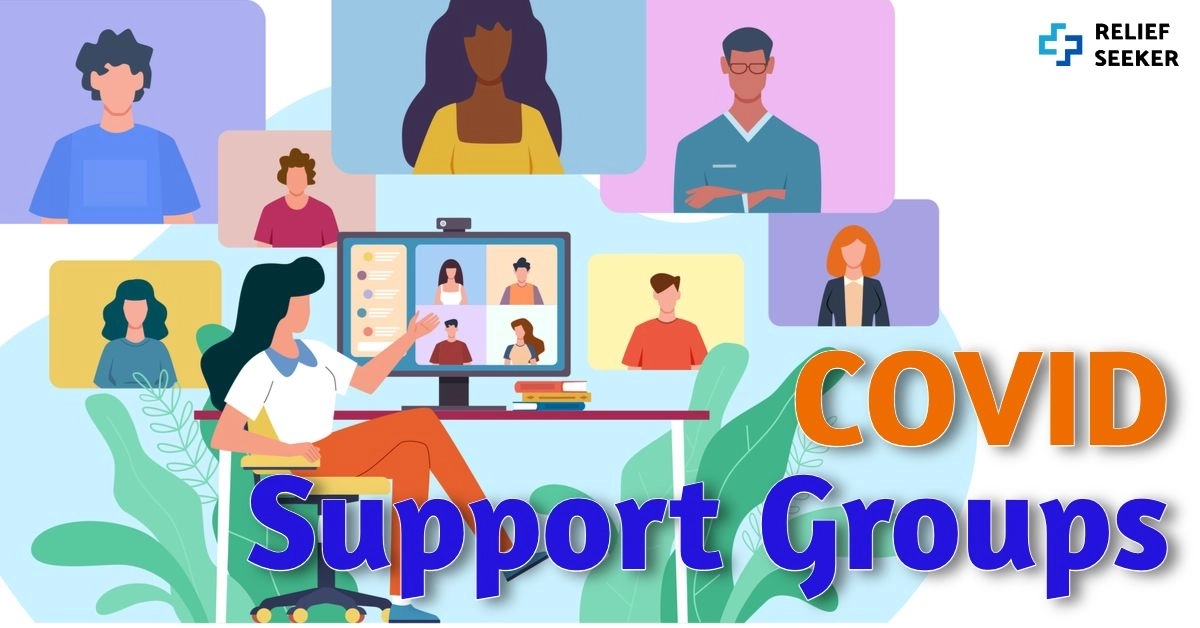The Centers for Disease Control and Prevention (CDC) reports that 40% of adults were struggling with mental health issues related to COVID-19 as of late June 2020. As pandemic numbers continue to rise throughout the country, it’s become apparent that we will be experiencing the effects of this health crisis for years (and possibly decades) to come.
If you’re struggling with the social, mental, or physical effects of the coronavirus, help is available — even if you’re unable to leave the house. Virtual support groups provide empathy, resources, and social interaction to anyone affected by the virus.
COVID support groups are a way to connect with others and get the support you so desperately need, even during social distancing.
Mental Health Conditions Associated With COVID
COVID-19 has sparked a surge in dozens of mental health conditions. Mental health practitioners all over the world have seen a surge in cases of depression, anxiety, and stress — all related to the pandemic.
Most coronavirus-related mental health conditions are considered situational depression, meaning the depression was triggered by a temporary situation (such as pandemic anxiety, death of a loved one, loss of a job, etc.).
Yet, the pandemic has also triggered post-traumatic stress disorder in many patients, too. People that have suffered financial losses, loss of loved ones to sickness or disease, or social isolation in the past are not re-experiencing that trauma in the times of COVID.
The most common mental health conditions related to the coronavirus include:
Depression
Anxiety
Stress
PTSD
Anxiety
Anxiety is one of the most common mental health disorders. It’s the body’s response to stressors, which in itself is a normal occurrence.
Our bodies need a way to react to stressors, and the release of cortisol and adrenaline is one of the most common biological responses. Otherwise known as fight-or-flight responses, these hormones help give our bodies the strength and speed we need to escape danger.
Yet, what happens when the stressors last for several days, weeks, or months? The constant stream of adrenaline and cortisol can actually hurt our bodies rather than help them.
Long-term anxiety can lead to chronic conditions, such as heart and lung disease, diabetes, obesity, fatigue, and pain.
Depression
40 million adults in the U.S. alone suffer from depression. According to the National Alliance on Mental Illness, 17.7 million people suffer major depressive episodes each year.
During the pandemic, that number has surged. Depression is a treatable condition, yet less than half the population seeks treatment for it — possibly as the result of the stigmas that circle around mental health disorders.
If you suffered from depression before the pandemic, there’s a good chance that your depression has worsened since COVID numbers started surging. If someone in your family suffers from depression, you’re also at a greater risk of developing symptoms.
Stress
Stress is another mental health condition that plagues millions of Americans each year. Most of us experience stress on some level. Yet like anxiety, stress can become a major health issue if not treated.
The pandemic has increased the numbers of people suffering from stress in the U.S. Situational stressors resulting from the pandemic may include loss of income, housing insecurity, food insecurity, health issues, social isolation, and more.
PTSD
Post-traumatic stress disorder (PTSD) is a condition caused by unresolved trauma. The coronavirus has triggered PTSD in patients all over the world. Issues such as food and housing insecurity, job loss, and death of loved ones can trigger these issues — and lead to future cases of the disorder.
Symptoms may include flashbacks, anxiety, nightmares, unwanted memories, and depression. People suffering from this condition also report visceral reactions to normally non-life-threatening triggers (such as loud noises or bright lights).
Who Needs COVID-19 Support Groups?
Any person that is suffering from a mental health condition due to COVID-19 may want to seek emotional support groups. Since the pandemic has affected nearly every person across the globe, there are plenty of others that ‘have been there’ when it comes to COVID.
Before joining a support group, you may want to find out what type of COVID support groups are available. Joining a niched group is advised — as you may not want to join a bereavement group if you’re suffering because of a job loss.
Finding a group of people that are experiencing a similar situation is the key to joining any support group.
Patients Recovering From COVID-19
One of the most common reasons to join a COVID support group is if you’ve suffered from and survived the virus.
Virus survivors have experienced not only a near-death situation — but possibly other domino factors, including job loss, death of a loved one, and social isolation. One of the most common side-effects of surviving any near-death situation is survivor's guilt.
Chatting with others that have experienced similar situations can help mitigate the loss and remind you that you’re not alone in your recovery.
Healthcare Providers
The group possibly hit the hardest by the pandemic has been healthcare workers. These professionals have worked round the clock to help fight the virus. They have put their own health at risk and have watched as the virus took the lives of so many.
If you are a healthcare professional that needs support, you may want to consider joining a COVID support group. Dealing with your feelings of anxiety and grief will help mitigate the impact the virus has on your mental health in the future.
Frontline Workers
Frontline workers have worked tirelessly throughout the pandemic to ensure we all get our essential needs met. If you work in an industry that has supported the public throughout the pandemic (from public transportation to supermarket and restaurant workers), help is available if you need it.
These workers risked exposure to the virus, worked long and sometimes unbearable hours, and often showed up without basic PPE supplies. Working in these types of stressful conditions can lead to PTSD, anxiety, exhaustion, and depression.
Talking through these feelings with other frontline workers can help prevent future chronic conditions and ease stress.
Friends and Family of COVID Patients
Patients suffering from COVID aren’t the only ones suffering. The friends and family members of patients that have contracted the virus also suffer from depression, anxiety, stress, and PTSD.
The novel coronavirus has not only taken hundreds of thousands of lives; many of the victims of the virus were isolated from their family members and were unable to see friends and loved ones.
If your loved one contracted the virus, you may find help in a support group. Even if your loved one has recovered, you may not have emotionally recovered from the experience. Talking to others that have been what you’ve been through can help work through some of that trauma.
Anyone Who Has Experienced Loss of Life
If one of your loved ones has passed away as the result of the coronavirus, public health officials recommend talking to a professional therapist to deal with these emotions. The sudden loss of hundreds of thousands of lives can leave a toll on your mental health, and working through these feelings with a licensed professional can help you process your grief.
People Suffering From Seasonal Depression
Seasonal depression can be debilitating any year. In a pandemic year, this condition has become unmanageable for some.
Seasonal depression (otherwise known as seasonal affective disorder or SAD) affects millions of Americans every year. If you suffer from this condition, social distancing and other aspects of pandemic life may exacerbate it.
Talking to others that suffer from mental illnesses can help ease your own suffering.
Anyone Who Has Suffered Financial Loss
If you’ve suffered a financial loss (loss of job, income, or housing), you may want to join a support group, too. These types of losses can lead to situational depression. If not treated, this type of depression can lead to higher risks of chronic health conditions, mental illnesses, and even death.
Those Suffering in Social Isolation
Even if the coronavirus hasn’t affected your health or financial well-being, a pandemic can still lead to health conditions and mental illnesses. Living in uncertain times can lead to a lack of self-care and certain lifestyle choices.
With gyms and healthcare centers closed, it’s harder to exercise and maintain good wellness habits. The Substance Abuse and Mental Health Services (SAMHSA) reports that social isolation can also lead to higher rates of substance abuse.
Support groups are often categorized by each individual issue, so you can find a group that fits your personal needs. You’ll find support groups ranging in topics from loneliness to mental exhaustion to relationship support to LGBTQ issues.
How Do Support Groups Work?
Support groups provide a space to help you work through your feelings of anxiety, grief, frustration, sadness, and more. Share your personal experiences with the group and get feedback on how to handle situations or simply support in your time of need.
Most support groups start with a brief introduction, followed by a few minutes of sharing from each individual. Some support group sessions revolve around a specific topic or theme. Others simply encourage participants to share what’s troubling them on any specific day.
Other members can respond to those sharing with coping strategies, support, empathy, and information. Sometimes clinicians will be present to help facilitate the group talk.
Types of COVID Support Groups
There are two types of COVID support groups available: in-person and online. In-person support groups aren’t as widely available (as states continue to shut down due to an uptick in coronavirus cases).
Luckily, online support groups are now readily available. There’s no need to leave your home to go to a meeting, and you can participate from wherever is most convenient.
In-Person Support Groups
In-person support groups have limited availability throughout the U.S. These groups generally meet at a designated time and place. They offer each person in the group opportunities to share stories and feelings about the topic. Then, others empathize, offer support, and provide assistance. Usually, groups are facilitated by one lead member.
Online Support Groups
Online support groups like Wisdo offer a similar experience, yet with a slightly different format. Some online support groups follow a virtual version of the in-person format (meeting online at a specific time either through Zoom video or chat room to share stories and provide support).
Others simply provide a platform to allow users to share their stories whenever they feel compelled to share. A user might post on a group chat and receive responses in real-time or throughout the week.
Moderators are usually present to ensure the well-being of members and flag any suspicious activity.
Other Resources
If you’re looking for a COVID support group, you may also want to consider talk therapy to supplement the work you do in your group. While support groups offer a cost-effective way to connect with others that may understand your unique position, they aren’t a substitute for therapy.
A licensed therapist can help you work through feelings of grief, sadness, depression, loss, and suffering. Support groups may be helpful, but it's important to keep in mind that members aren’t licensed therapists.
If you need help but can’t (or don’t want to) leave home, you may want to opt for online therapy platforms, like Talkspace. Telehealth mental healthcare platforms match you with a therapist that specializes in your unique mental health issues.
Make video appointments or send your therapist text, video, or voice messages.
Grassroots groups like Survivor Corps are helping to connect COVID-19 survivors and support medical and academic pandemic research.

